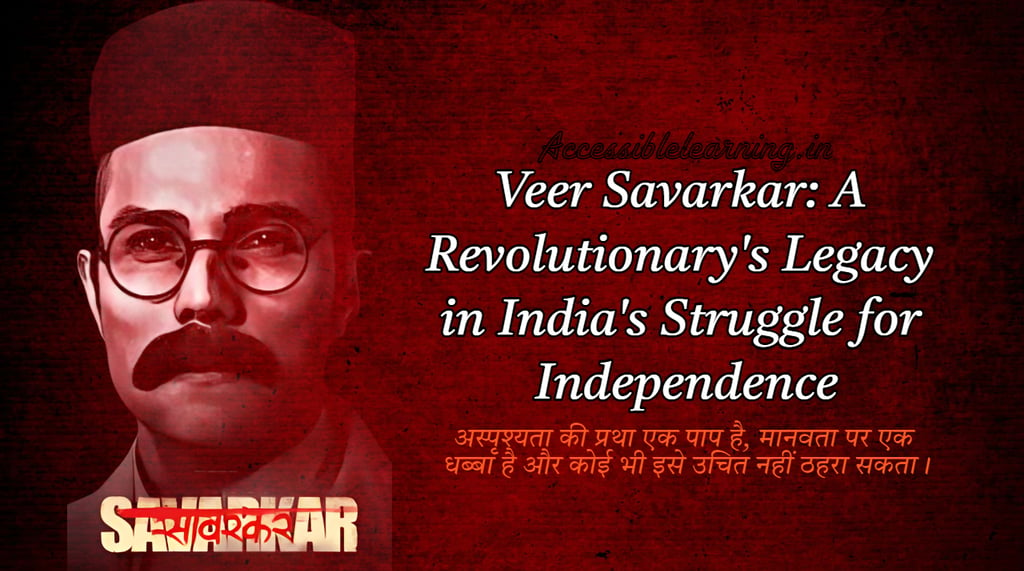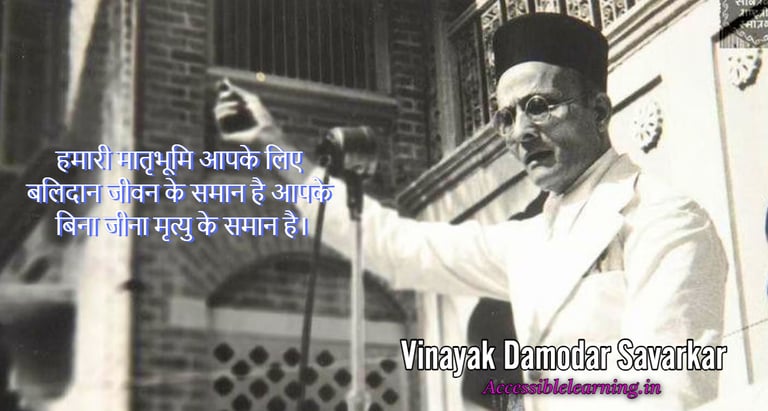
Veer Savarkar: A Revolutionary's Legacy in India's Struggle for Independence
Born on May 28, 1883, in the quaint village of Bhagur, Maharashtra, India, Savarkar was imbued with a spirit of freedom and nationalism from his early years.
THE GREAT LEADERINDIAN HISTORYEDUCATION/KNOWLEDGEBIOGRAPHYHISTORY
Keshav Jha
3/9/20243 min read


Vinayak Damodar Savarkar Ji, fondly known as Veer Savarkar, was not only a prominent Indian nationalist but also a versatile personality who left an indelible impact on the Indian independence movement. Born on May 28, 1883, in a quaint village called Bhagur in Maharashtra, India, Savarkar was imbued with the spirit of independence and nationalism from his early years.
His intellectual foundation was laid on the works of great figures such as Swami Vivekananda and Bal Gangadhar Tilak, whose ideas deeply influenced his outlook on India. This influence pushed him into the whirlpool of the freedom struggle, even as he pursued higher studies in London.
In 1905, Savarkar took a decisive step by founding the Abhinav Bharat Society, a secret organization with the express goal of ending British rule in India. This marked the beginning of his active participation in revolutionary activities aimed at liberating his motherland.

However, Savarkar's revolutionary zeal led him into conflict with the British colonial authorities. In 1909, he was arrested on suspicion of involvement in the murder of a British officer and later sentenced to two life sentences totaling fifty years. He was imprisoned in the dangerous Cellular Jail located in the remote Andaman and Nicobar Islands, where he endured unimaginable hardships and torture.
Despite the harsh conditions of imprisonment, Savarkar's spirit remained unbroken. It was during his detention that he wrote his seminal work "The First War of Indian Independence," in which he introduced the concept of "Hindutva" as the fundamental principle of Hindu nationalism.
Released in 1924 after more than a decade behind bars, Savarkar resumed his activism for India's independence with undiminished enthusiasm. He continued to garner support through his writings and speeches, advocating a revitalized India free from colonial shackles.
However, Savarkar's legacy remains a matter of debate and controversy. His staunch advocacy of Hindutva and the Hindu Mahasabha, which he founded in 1915, has made him a polarizing figure in Indian politics. Yet, his unwavering commitment to India's independence and his fearless challenge to colonial oppression cannot be denied.
Even after India gained independence in 1947, Savarkar remained active in political and public life, serving as president of the All India Hindu Mahasabha and a member of the Rajya Sabha. He breathed his last on February 26, 1966, leaving behind a legacy that still gives rise to strong emotions and ideological debates.
In the annals of Indian history, Veer Savarkar stands as a great personality—a fearless freedom fighter whose life exemplifies the indomitable spirit of resistance and the pursuit of national self-determination. Despite the controversies surrounding his ideologies, his contribution to India's freedom struggle remains etched in the collective memory of the nation.
An Unknown Story!
This story is perfect for young children who are eager to learn about Veer Savarkar.
During his time in Cellular Jail, Veer Savarkar's spirit of resilience and unwavering dedication to India's freedom inspired not only his fellow prisoners but also the prison staff. Despite the harsh conditions and relentless torture, Savarkar remained steadfast in his commitment to his ideals.
One incident, in particular, stands out as proof of his indomitable spirit. One day while in jail, Savarkar found a piece of coal. Instead of using it for personal comfort or writing, he carefully carved the words Vande MataramHail to the Motherland) on the prison walls.
This simple act of defiance against his captors speaks volumes about Savarkar's unwavering patriotism and his steadfast resolve. It was a reminder that even in the darkest times, the flame of freedom continues to burn within those who dare to dream and fight for a better tomorrow.
Years later, after his release from prison, Savarkar continued to inspire countless individuals with his courage and determination. His story is a ray of hope and a reminder that the spirit of resistance can never be extinguished, no matter how adverse the circumstances.


Subscribe to our newsletter
All © Copyright reserved by Accessible-Learning
| Terms & Conditions
Knowledge is power. Learn with Us. 📚


